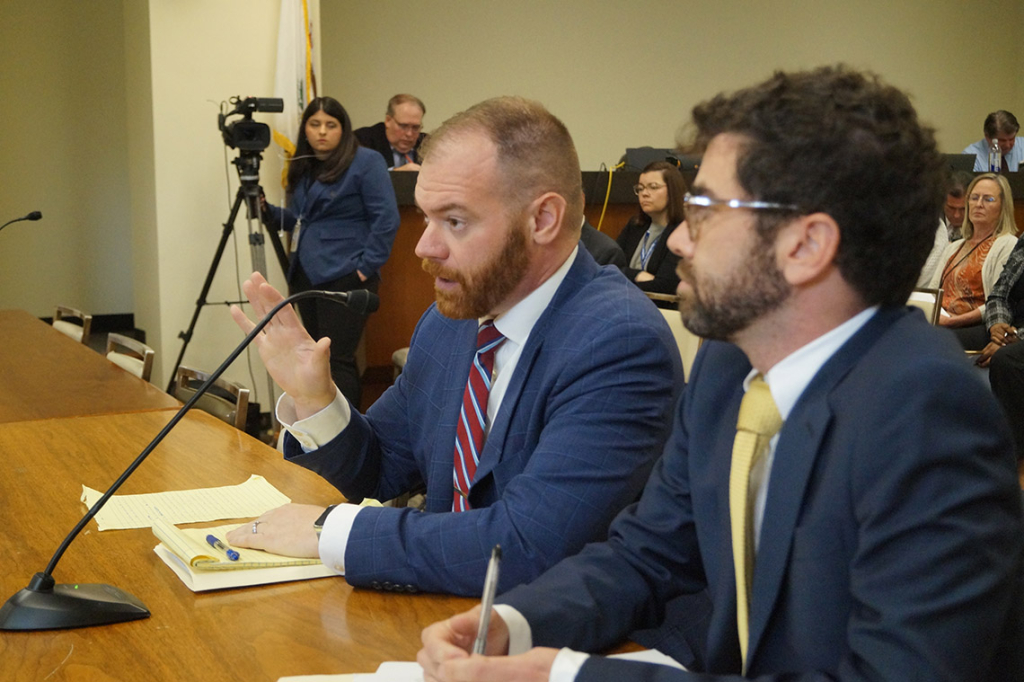
SPRINGFIELD – A legislative committee and the Illinois Department of Agriculture agreed recently to delay finalizing new regulations governing hemp production amid an outcry of protests from small, independent producers.
Those proposed rules have been in development for at least two years. But the most recent draft, submitted in September, contained significant changes from earlier versions that caught many in the industry by surprise. That included provisions allowing unannounced inspections and testing of hemp crops, restrictions on who could obtain a license to produce the crop, and the possibility of criminal sanctions for violations of certain rules.
Norma Fuentes, a lobbyist for the Illinois Hemp Business Association, which represents small, independent and minority-owned hemp businesses, said the rules threatened to put many of them out of business.
“It kind of fueled a second War on Drugs, disenfranchised social equity licenses and also financially burdened local businesses through some of the testing that they require,” she said of the latest proposed rules.
Industrial hemp was once a significant crop in the United States in the 19th century when it was used for making common products like rope and textiles. But it came under strict government control in the 20th century because of its close biological relationship to marijuana, first with passage of the Marihuana Tax Act of 1937, and later with a complete ban with passage of the 1970 Controlled Substances Act.
Nearly half a century later, with the rise in popularity of certain hemp-derived products like CBD oil that are thought to provide health benefits, federal control over hemp finally began to loosen.
First, the 2014 federal Farm Bill allowed colleges, universities and state departments of agriculture to engage in pilot programs producing hemp for research purposes. Then in 2018, both the state and federal governments passed laws legalizing large-scale commercial hemp production, subject to regulation.
The 2018 federal Farm Bill reclassified hemp – defined as cannabis with less than 0.3% of the intoxicating chemical THC – by removing it from the list of controlled substances and making it eligible for traditional farm programs like crop insurance and farm loans.
And the Illinois General Assembly that year passed the Industrial Hemp Act, giving the state Department of Agriculture authority to regulate the industry, including the licensing of growers and processors, in accordance with federal laws and regulations.
Since then, the Illinois Department of Agriculture has worked to promulgate rules consistent with both the state and federal hemp laws.
According to a timeline provided by IDOA, the agency implemented its first set of rules in 2019, shortly after passage of the Industrial Hemp Act, and those have been used as the basis for regulating the industry in Illinois so far.
Later that year, however, USDA published “interim” federal rules that spelled out details for how states were to carry out the law and requiring states to submit their own individual “hemp plans” to the federal agency for approval.
Since Illinois already had rules in place, IDOA merely drafted amendments to those rules and submitted those to USDA as the state’s plan. USDA approved that plan in October 2020.
Then in January 2021, USDA published “final” rules for hemp production that contained significant changes from the interim rules of 2019, which required the state to make major changes to its rules.
In December 2021, IDOA submitted a revised hemp plan to USDA for approval and, after that plan was approved at the federal level in April 2022, the agency began the process of submitting that plan through the state rulemaking process.
That process has now taken more than two years, during which time the proposed rules have undergone even more changes. But David Lakeman, IDOA’S division manager for cannabis and hemp, told the legislative Joint Committee on Administrative Rules at a Nov. 12 meeting that the agency’s intent has never changed.
“To be clear, the department’s intent here is solely to align and implement the United States Department of Agriculture’s rules on hemp as implementing the 2018 Farm Bill,” he said.
Speaking in a separate interview, however, Fuentes said the latest draft of the proposed rules contains significant changes from earlier drafts that have alarmed many in the hemp industry.
For example, she pointed to one provision that would prohibit individuals from obtaining a hemp license, or even holding a management position within a licensed hemp company, if they have been convicted of a drug-related felony within the previous 10 years.
She noted that under the state’s Cannabis Regulation and Tax Act – the 2019 law that legalized recreational marijuana – Illinois gives preference to license applicants who were previously harmed by the war on drugs.
Lakeman, however, told JCAR the proposed licensing restriction is needed to comply with federal law.
“The federal government and USDA has been extremely rigid on that section, for us and for every other state that is running its own hemp program,” he said.
Fuentes also pointed to new provisions authorizing IDOA to conduct random, unannounced inspections and testing of hemp facilities, whereas earlier versions of the rule required the agency to give at least five days’ notice.
“It opens the gate for overpolicing and criminalization of some of this industry, which is what we believe starts and fuels a second War on Drugs,” she said.
The proposed rules also contain a provision allowing administrative penalties or, in some cases, criminal referrals to law enforcement agencies for violations of the rules.
Although the proposed rules were scheduled for final approval Nov. 12, IDOA agreed to delay final action for 45 days to allow time for the agency to hold additional meetings and answer questions from industry representatives and other stakeholders.
The rules will come up for consideration at JCAR’s next scheduled meeting on Tuesday, Dec. 10, in Chicago.
Capitol News Illinois is a nonprofit, nonpartisan news service that distributes state government coverage to hundreds of news outlets statewide. It is funded primarily by the Illinois Press Foundation and the Robert R. McCormick Foundation.






